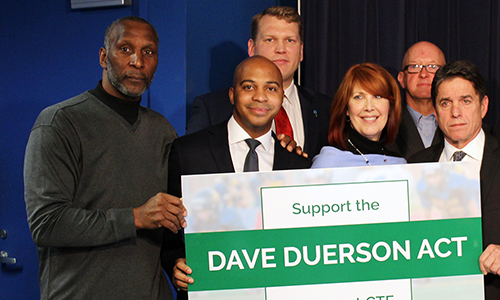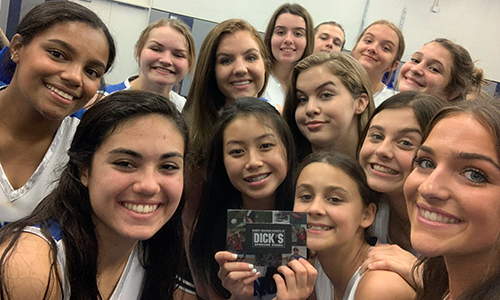GET INVOLVED
Participate in Research
Why participate in research?
Research is the key that unlocks our ability to prevent and treat the effects of brain trauma. Brain bank research has provided undeniable evidence of how repetitive brain trauma affects behavior, thinking and memory. Clinical research on human volunteers plays an equally critical role in accelerating progress and can provide crucial insights on potential treatments. You can scroll down this page to learn about actively recruiting research studies that you may be eligible for.
First, watch Dr. Robert Stern, director of clinical research at the Boston University CTE Center, explain why you should participate in research.
Imminent Brain Donation
For imminent brain donation matters, please call the 24-hour emergency donation pager at 617.992.0615.
For imminent brain donation matters in Australia, email SPORTS Brain Bank or call the 24-hour line at (02) 8005 6891.
Sign up for the CLF Research Registry
The CLF Research Registry comprises the Brain Donation Registry (BDR) and Clinical Research Registry (CRR). You may sign up for one or both. All adults, with or without a history of sports participation or military service, are eligible to join the Research Registry.
BDR members will receive a personalized brain donor card and informational brochure. CRR members will receive regular communications recruiting them to clinical research studies on concussions and CTE. Click here to join the Research Registry or learn more.
Project S.A.V.E
Location: Boston University or the University of California, San Francisco
Seeking: Men and women age 50 or older who played 5+ years of a contact sport, including American football, ice hockey, soccer, lacrosse, boxing, full contact martial arts, rugby, and wrestling. The study consists of a 1-2 day study visit at either Boston University or the University of California, San Francisco. Each visit will consist of an advanced MRI of the brain; neurological, cognitive, self-report mood and behavior exams; blood samples; and an optional lumbar puncture. Participants will return annually.
Goal: S.A.V.E. stands for Study of Axonal and Vascular Effects from repetitive head impacts. The major goal of this study is to determine how repeated head impacts from playing contact sports can lead to long-term thinking, memory, and mood problems. The results of this study could inform on strategies to treat and prevent symptoms associated with head impacts from contact sports.
To participate in Boston: Phone: (617) 358-6545 Email: joinhope@bu.edu
To participate in San Francisco: Email: karen.smith@ucsf.edu
HITSS Study
Head Impact & Trauma Surveillance Study
Location: Entirely online at www.HITSS.org
Seeking: Anyone aged 40+ who played soccer or tackle football at any level – youth, high school, college or pro/elite. Participation is a fully-online survey that includes questionnaires on sports participation, medical history and behavior and mood, and brain games. It only takes approximately two hours to complete, and can be completed at any time and over several days, if desired. Participants are then asked to take a follow up assessment online one year later.
Goal: The major goal of HITSS is to answer questions about risks of developing later life brain health issues from repetitive head impacts in contact sports. To learn more or to participate click here.
Contact: HITSS@BU.edu
HOPE CTE Study
Health Outreach Program for the Elderly
Location: Greater Boston
Seeking: Male and female subjects who are at least 50 years old, played a minimum of five years of football, MMA, boxing, rugby, soccer, or ice hockey, with two of those years occurring at the collegiate, semi-professional, or professional levels. Participants will have a two-day visit once a year to the BU School of Medicine to participate in a variety of tests, including a neurologic exam, memory and cognitive tests, mood and behavior questionnaires, a blood draw, and an MRI scan.
Goal: The HOPE Chronic Traumatic Encephalopathy (CTE) study is designed to develop methods of diagnosing CTE during life. This is an extension of the Health Outreach Program for the Elderly (HOPE) Study of the Boston University Alzheimer’s Disease Center.
Interested in participating? Contact joinHOPE@bu.edu or 617.358.6545.
Athlete Brain Health & Aging Study
Athlete Brain Health & Aging Study
Location: National
Seeking: Former NFL players, former Division I college football players, and former male college athletes who never played contact sports.
Goal: The purpose of this research study is to use research to improve health and support the well-being of men of all ages. Previous research on brain health has focused on biological factors, but we know that a person’s psychology, personal beliefs, social groups, and surroundings are also fundamental for brain wellness. These psychosocial factors vary for different groups, such as among Black, White, and Latino men, but more must be understood about how these factors affect brain health. The goal of this study is to discover the effects these important factors have on brain aging to support people like you, your friends, family, and community members.
Interested in participating? Click here to learn more.
The Exercise and Concussion Health Study (TECHS)
The Exercise and Concussion Health Study (TECHS)
Location: Within travel distance of Northeastern University
Seeking:
Individuals aged 18-55 who have suffered a concussion within the past year.
Interested in participating? Click here to learn more.
Click below to view studies that CLF has completed recruiting for.
You May Also Like

Help us raise awareness about concussions, PCS and CTE in your community. Learn how to create positive change by becoming a CLF Champion.
Become a CLF Champion
There are many ways you can help contribute to CLF. See how you can fundraise in your community and beyond to support our work.
Ways to Give